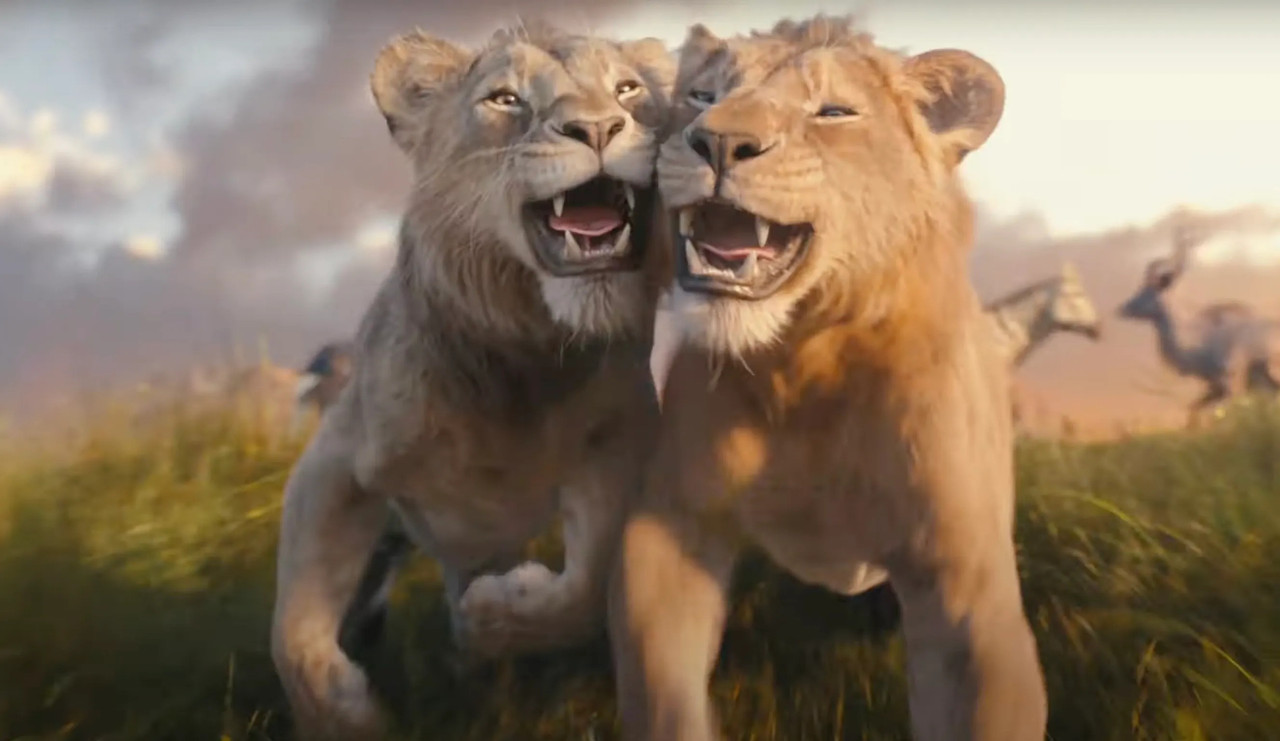With this prequel to 2019’s photoreal-ish re-do of 1994 Disney alpha-hit The Lion King, director Barry Jenkins (of Moonlight Oscar-win fame) has joined the ranks of cool independent auteurs trying for an unexpected splash in the studio guard-railed mainstream. But Jenkins seems a weirder match for this sort of movie than most. A director who specializes at showing raw, emotional humanity and finding beauty in actual, location-based situations creating a fully computer-manufactured picture about singing animals? It’s unsurprising to find he came close to turning Mufasa down without having reading the screenplay.
Of course, in the end, he did read it, and you can see why it clicked: the theme of found family that powered Moonlight is present here, too, as lion cub Mufasa (Aaron Pierre) is separated from his parents during a raging flash-flood, and is reluctantly taken in by another pride, finding an adoptive brother in its prince, Taka (Kelvin Harrison Jr). Unlike Taka, Mufasa must earn his place through difficulty — and feminine perceptiveness, too, it seems — rather than inheriting it.

Beyond that nucleus of Jenkins-ness, however, there is little to really dig your teeth into. After an assault on Taka’s pride by white-furred outsiders (whose overlord is yet another Mads Mikkelsen villain), the story trots along from points A to B, tossing in some romantic tension (both brothers fancy plucky lioness Sarabi, voiced by Tiffany Boone) and a few pleasant enough Lin-Manuel Miranda songs, which might have been buoyed by choreography more inventive than having the animals go around in circles a bit. It’s all framed by a story-time-for-Simba’s-cub device, which allows for guest appearances from the 2019 film — most intrusively meerkat Timon (Billy Eichner) and warthog Pumbaa (Seth Rogen), whose hyperactive meta riffing feels a little too desperate to wring laughs from an otherwise mostly sober affair.
And a bloodless one, too. Despite all the photoreal teeth and claws, there’s just one notable scratch amid the countless big-cat confrontations, while all the animals miraculously remain clean, without a single spot of matted fur between them. This, as much as the continuous uncanniness of witnessing ‘real’ monsters sing and converse, jars with the ultra-realist style and once again makes you desire for a bolder, more creative approach. Plus, frankly, we could have lived without all the snout-focused, 3D-calibrated framing; hasn’t film got over this by now? Still, if the objective was to distract younger audience members with some inoffensive and well-meaning adventure, the movie delivers. It’s a shame Jenkins wasn’t able to personalise it more, but, as they say, that’s simply the nature of the beast.

A lesson that bears repeating in this era of studio IP-juicing cash-in productions is that however beloved the source material, however many hundreds of millions you plough into a project (the budget for Musafa has not been made public but is estimated to be north of $200m), the resulting film will only ever be as good as its screenplay. Herein is the difficulty. The writing, by Jeff Nathanson, is schmaltzy, derivative and dreadfully serious. It recycles themes and gadgets from the preceding photographs. The efforts at comedy, courtesy of returning characters Pumbaa the warthog (played by Seth Rogen) and Timon the meerkat (Billy Eichner), land flatter than roadkill.
Read Also: Grand Theft Hamlet Review
At the center of the story is the troubled connection between two brothers - a tale as old as time, with origins that stretch back to the Book of Genesis: Mane and Abel, if you will. This connection is exacerbated by the fact that Mufasa, who was separated by roaring flood waters from his parents as a cub (Braelyn Rankins), and Taka, a lion princeling of aristocratic ancestry, aren’t connected by blood. After Taka (voiced by Theo Somolu as a cub; Kelvin Harrison Jr as a young adult) rescues Mufasa from the jaws of crocodiles, Mufasa is adopted by Taka’s pride and claimed by Taka as a brother. I Always Wanted a Brother — one of Lin-Manuel Miranda’s catchier pieces for the film’s soundtrack – cements the adoptive bond.
Not everyone is welcome. Taka’s regal father, the king of his dominion and head of the pride, banishes Mufasa to live with the lionesses. There, Mufasa learns to hunt and track. Taka, meanwhile, enjoys the prestige of the male lions’ inner circle, but learns nothing more than the technique of taking daylong sleeps. When the pride is challenged by a rival clan of albino big cats, commanded by the angry Kiros (Mads Mikkelsen) and set on the indiscriminate death of all other lions, Taka rapidly discovers that he is ill-equipped to fight back. On the command of his father, Taka escapes the threat of the invading pride to preserve the lineage, with Mufasa as his trusted bodyguard.












